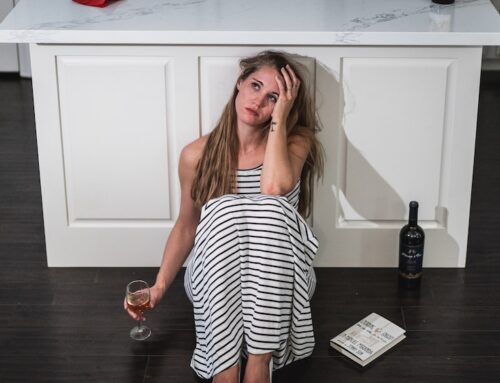No Vacation from Recovery: A Packing List
By Kerry Neville
Recovery cannot be left to chance but requires planning, even—and maybe especially—on vacation with its temptations: tropical drinks, laissez-faire schedule, swim-up bars, and late nights.
![]()
When we leave home for the unknown, we can get lost, even with the precision of GPS, even with years of sobriety or stability, even if we are confident in our now reliable happiness.
For a long time, when my bipolar disorder, alcoholism, and eating disorder were out of control, I believed that the geographic cure, specifically travel, was the antidote to all my ills, as if I could take a vacation from addiction and mental illness. I would pack my bags and land in some exotic port of call, a Greek island, for instance, certain that I would find happiness in the reliable sunshine, the deep blue water, the daily swims, the Mediterranean food, and in a self somehow suddenly better—better in illness and better in soul.
“Surely, surely the less frenetic island pace will slow me down,” I would tell myself. “I’m always happy there, lying on the beach, eating ripe peaches, hiking through the olive groves, and snorkeling in search of sea urchin shells.” Within days of arrival, I’d be miserable, again, flat out suicidal, wanting to swim out into the blue sea, going and going, or wanting to hurl myself off a steep cliff. No vacation from addiction and mental illness.
What I have learned in my eight years of stability and sobriety is that there is no vacation from recovery, either.
My first sober vacation with my now-ex-husband was to Jamaica. Hubris testing those waters, which was a paradise for my ex with its endless supply of Red Stripe and ganja but treacherous for me, only a few months sober. My then-husband had been travelling to Negril for twenty years chasing that perfect beach buzz while I was trying to stay steady, surrounded by all these happy (seeming) vacationers, and trying to remember why I did not want to drink, why I could not ever drink again. Naively, I packed without a contingency plan, bringing just a bikini, sunscreen, and a dress. Nothing to support my recovery. Thankfully, my Higher Power had a contingency plan.
The first day while we were lazing in the sun, another couple, Amy and Rich*, sat in the lounge chairs beside us. We made small talk and my then-husband said, “I’m heading up to the bar for a Red Stripe. Anybody want anything?”
“Coke for me,” I said.
“I’ll take a coke,” Rich said. “Thanks.”
“Me, too,” Amy said.
My antennae attuned, I said, “Are you guys in the club, too?”
They knew what I meant and from then on, we were inseparable. Amy and Rich, sober for decades, prepared in advance for the trip. With a little online research, they’d found a 12-step meeting off the beach in a tiny church and we went together, in flipflop solidarity. Lesson learned? Recovery cannot be left to chance but requires planning, even—and maybe especially—on vacation with its temptations: tropical drinks, laissez-faire schedule, swim-up bars, and late nights. What happens in Vegas or London or New York City or Rome or Kathmandu doesn’t stay there, but stays with you, a permanent souvenir. In recovery, we don’t get a free pass.
I now have a packing list that I stick to for all my travels, the practical essentials and spiritual necessities that support my recovery and stability. When we leave home for the unknown, we can get lost, even with the precision of GPS, even with years of sobriety or stability, even if we are confident in our now reliable happiness.
My Recovery Packing List:
Proper Running Shoes: Know whether you are running away from your life or running towards a bigger life. I have used travel as an escape from myself, from the circumstances of my life that felt out of control (my drinking, my starving, my depression). Every time I tried to run away to some other place, I wound up desperate, without family or friends, without a support system, and hit a new bottom each time. But when I am running on stable ground towards a joyful life? A few years ago, I stayed at a yoga ashram in the Bahamas. One morning, I took a sunrise walk down the beach and felt utterly content breathing in the sun and sea, at ease with myself in my solitude.
A Map: Know where you came from, where you are now, and where you are going. On a three-week solo trip to Morocco, I meticulously planned the route between the Atlas Mountains and Marrakech and Ouarzazate and Essaouria—unfamiliar terrain without a co-pilot. But more, I needed to remember how far I had come in sobriety so that I could travel alone, out into the world, without family and friends worrying that I might hit bottom, and to know that my journey forward was now one filled with adventure rather than danger. So, I wrote myself a note that I kept inside my wallet: I was once at the bottom of the well; I am now on dry land; I am heading for the horizon!
Carry On (Not Checked Luggage): That is pack light. Don’t carry the weight of the past, only your sober and stable self. What use are sandals and sneakers and snorkels and sunscreen and travel guides and a Kindle downloaded with beach reads if you don’t have room for The Big Book or a journal to record 12-step work? And what use are these essentials for continued recovery if they get lost in checked baggage? If books are too heavy, download 12-step apps and The Big Book to your phone. And why bring them along if you don’t read them? Begin the day reading whatever you might find that anchors you to recovery. Me? It is usually the poem “Late Fragment” by Raymond Carver:
And did you get what
you wanted from this life, even so?
I did.
And what did you want?
To call myself beloved, to feel myself
beloved on the earth.
Emergency Contacts: Not just family and friends, but sponsors, therapists, and doctors. Too expensive to call overseas? Download an app (such as WhatsApp) so it is free to call people who will remind you who you are becoming, to hear a familiar voice when you’re out there wandering the world and veer off map. In the middle of the Sahara, just off a camel ride through a sandstorm, I Skyped with my sponsor. “Hellooooo,” I said. “I’m calling from the middle of nowhere though I am somewhere beautiful and not at all lost!”
Local Hangouts: Once upon a time, you might have researched bars and nightspots. Now, as I learned from Amy and Rich, I research local 12-step meetings and make it a traveling priority to attend the meetings. Fellowship exists across this world and all we have to do is walk through the door to find our tribe. And if no meeting exists? Keep our antennae attuned to those around us who aren’t ordering booze. On a recent trip to Ireland, I met a local over dinner who I noticed wasn’t drinking. I mentioned to him that I didn’t drink either. “Are you a friend of Bill W.?” he asked, then invited me to go with him to a 12-step meeting later that night. Home on the road.
Of course, make sure your passport—proof of citizenship and of far-flung travel—is up-to-date. A passport is a dream journal: where have I been and where do I want to go? And in recovery, a passport is a record of courage (those stamps) and of hope (those blank pages) that says: I want to risk myself in the world and am ready for the journey. Necessities packed. Never alone on the road.
*Not their real names

